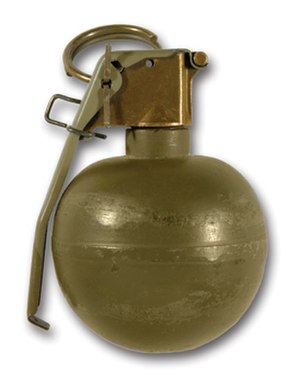M67 grenade
| M67 | |
|---|---|

The M67 fragmentation grenade.
|
|
| Type | Hand grenade |
| Place of origin | United States |
| Service history | |
| In service | 1968–present |
| Used by | United States, Canada, Argentina, Turkey, Malaysia. |
| Wars | Vietnam War, Falklands War, Persian Gulf War, War in Afghanistan, Iraq War |
| Production history | |
| Designed | Late 1950s |
| Produced | 1968–present |
| Specifications | |
| Weight | 0.875 lb (0.397 kg) |
| Length | 3.53 in (90 mm) |
| Diameter | 2.5 in (64 mm) |
|
|
|
| Filling | Composition B |
| Filling weight | 0.4 lb (0.18 kg) |
|
Detonation
mechanism |
Pyrotechnic delay M213 fuze—4 seconds |
| M69 | |
|---|---|

M69 training grenades
|
|
| Type | Hand grenade |
| Place of origin | United States |
| Service history | |
| In service | Current |
| Used by | United States |
| Specifications | |
| Weight | 14 oz (400 g) |
| Length | 3.53 in (90 mm) |
| Diameter | 2.5 in (64 mm) |
|
|
|
| Filling | None |
|
Detonation
mechanism |
Pyrotechnic delay fuze – 4 seconds |
The M67 grenade is a fragmentation hand grenade used by the United States military. The M67 is a further development of the M33 grenade, itself a replacement for the M26-series grenades used during the Korean and Vietnam Wars, and the older Mk 2 "pineapple" grenade used since World War II. The M67 hand grenade has an effective casualty radius of about 15 meters (49 feet).
The M67 grenade has a spherical steel body that contains 6.5 oz (180 g) of composition B explosive. It uses the M213 pyrotechnic delay fuze. The M67 grenade weighs 14 oz (400 g) in total and has a safety clip to prevent the safety pin on the grenade from being pulled accidentally. The safety pin prevents the safety lever, or "spoon" on the grenade from moving and releasing the spring-loaded striker which initiates the grenade's fuze assembly.
The M67 can be thrown 30 to 35 metres (98 to 115 ft) by the average male soldier. Its fuze delays detonation between 4 and 5 seconds after the spoon is released. Steel fragments (not to be confused with shrapnel) are provided by the grenade body and produce an injury radius of 15 metres (49 ft), with a fatality radius of 5 metres (16 ft), though some fragments can disperse as far out as 250 metres (820 ft).
To deploy the M67 grenade, the user first removes the safety clip from the grenade.
Next, the grenade's pull ring is grasped with the non-throwing hand while maintaining a firm grasp on the body of the grenade and safety lever (also referred to as the "spoon") with the throwing hand. The pull ring and safety pin assembly are fitted so that a right-handed thrower can grasp the grenade with the fuse assembly on top and the safety lever held down by the right thumb. A left-handed thrower should grasp the grenade with the fuse assembly on the bottom and the safety lever held down by the left thumb.
The user then pulls the grenade and pull ring assembly apart, removing the safety pin from the fuse assembly. At this time, the fuse remains unfired, as the throwing hand's thumb is holding the safety lever down.
...
Wikipedia
